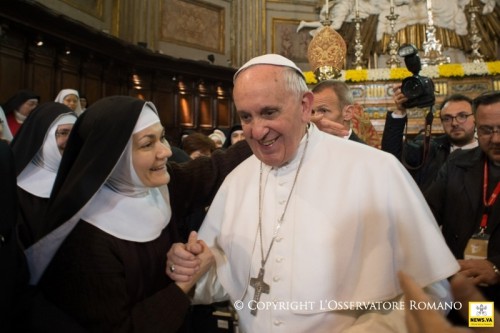Stereotypical images tend to come to mind, at least the non-Catholic British mind, when we think of nuns. We think of Julie Andrews and The Sound of Music. Perhaps Sister Wendy Beckett delivering art lectures. We might just stretch to Mother Teresa in the slums of Calcutta.
Like most stereotypes, such images are both unhelpful and out-dated. The OED definition of the word is “Woman living in a convent usually under vows of poverty, chastity and obedience”. It also, usefully, reminds us that it derives from the Latin word “nonna”, the feminine version of “nonnus” meaning monk, but also the same as the modern Italian word for grandmother. And like modern grandmothers, nuns may be found in a wide range of roles, places and occupations.
A look in the Holy See’s directory reveals hundreds of different female religious orders. All are dedicated to God and to service. But what variety that encompasses! I recently spent a few days in Venice, where I stayed with my family in a House run by the Sisters of Missionary Servants of the Holy Sacrament. While their numbers are diminishing in Europe, they are flourishing in the Philippines, and actively living their vocation of spreading the Gospel amongst lay people and families. Their hospitality to us and other visiting groups was exceptionally kind. Professionally, my embassy has worked closely with members of the Women Superiors of Italy in their work to tackle human trafficking, bringing together their incomparable networks to support victims trafficked to places like the UK, and reunite them with their families from Albania to Nigeria. And just last month, I met a number of members of the Council of the International Union of Superiors General – including Benedictines, members of the Missionaries of Our Lady of Africa, and Loreto Sisters – to discuss sexual violence against women in conflict. We examined how their networks, especially in Africa, might link with those of the UK and other countries in helping to end the culture of impunity against sexual violence perpetrators, and better protect women and men from the crime.
Round the table at such gatherings have been psychologists, surgeons, social workers, professors, administrators, management consultants, health workers, accountants and computer experts. As it happens, all have been nuns. All dedicated to poverty, chastity and obedience. And all making a difference to the lives of others in our very contemporary world.
So when you next think of nuns, by all means remember Mother Teresa, but also think, perhaps, of the African sister who suggested to me how her Congregation might set up a smart phone app to provide advice to first responders in conflict zones where sexual crimes may have been submitted. Or the Scottish sister in Rome who is running management and leadership courses for men and women in the Church. Or even Mary Ward (1585-1645), Yorkshire born and bred, who resisted the glass ceilings and discrimination of her time to found an active ministry outside convent walls, and was placed on the first rung towards sainthood by Benedict XVI. That’s the reality. Not a guitar in sight.

